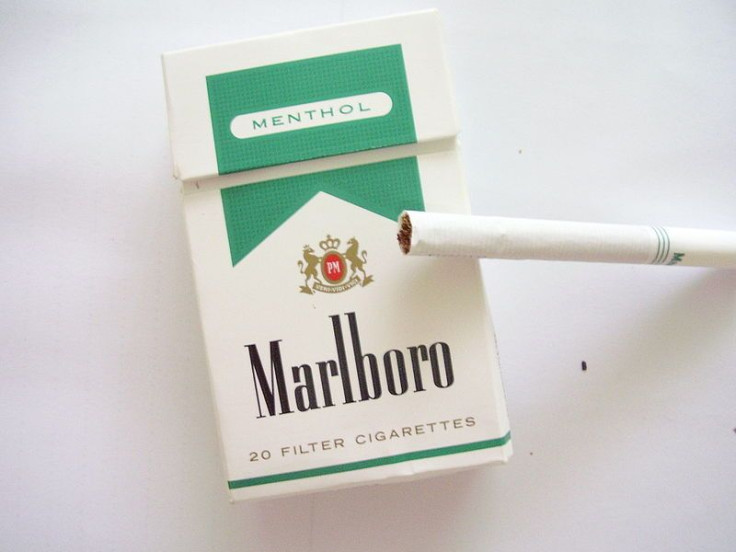FDA Calls Public To Weigh In On Menthol Cigarettes; Do The Minty Smokes Pose Any Health Risks?

The cooling sensation and minty taste of menthol cigarettes could be a thing of the past for smokers of the menthol brands. The Food and Drug Administration (FDA) has called on the public to weigh in on the future of the cigs and the tobacco industry. In a FDA news release, the administration calls upon the public to provide comments, data, research, and other information to help them make a well informed decision on how to tackle the health issues affiliated with the minty smokes. According to the federal Substance Abuse and Mental Health Services Administration (SAMHSA), the percentage of Americans who smoke menthol cigarettes rose from 33.9 percent in 2008 to 37.5 percent in 2011. The increase in menthol cigarettes was highly significant among younger smokers because of their minty flavor and "cooling" and "soothing" effect that tobacco companies have marketed.
The Centers for Disease Control and Prevention (CDC), has reported that the cigarette industry that has experience a decline throughout the years, a 36 percent decrease of per capita cigarette consumption from 2000 to 2011. A ban or restriction on menthol cigarettes could mean bad news for menthol manufacturing brands.
"The FDA is committed to a science-based approach that addresses the public health issues raised by menthol cigarettes, and public input will help us make more informed decisions about how best to tackle this important issue moving forward," said FDA Commissioner Dr. Margaret A. Hamburg.
How You Can Weigh In On Menthol Cigarettes
The FDA wants to increase public awareness on the health dangers of menthol cigarettes by providing public access to a series documents discussing the minty smokes. As tobacco remains the leading cause of preventable death and disease in the U.S., the FDA wants to establish tobacco product standards based on both public opinion and scientific knowledge. The FDA news release states, "about 30 percent of all adult smokers and more than 40 percent of all youth smokers report smoking menthol cigarettes." The growing trend in the younger generation leads to health concerns that could affect them in the future.
ANPRM And You
The administration has made available an Advance Notice of Proposed Rulemaking (ANPRM) to the public that will be made available for 60 days. In this notice, the public will be able to give their input about menthol cigarettes in the docket that will help the FDA determine if there should be any regulatory action taken in regards to the minty smokes. In the event that the FDA decides to make a rule regarding the matter, the public will once again get to comment on the proposed rule suggested by the administration.
Preliminary Evaulation of Menthol Versus Nonmenthol Cigarettes And You
In addition to the issue of the ANPRM, public opinion will also be granted in the FDA's independent Preliminary Scientific Evaluation of the Possible Public Health Effects of Menthol Versus Nonmenthol Cigarettes. This evaluation examines the health risks associated with menthol cigarettes and filter cigarettes and how these two forms of tobacco may result in different outcomes for smokers, respectively.
Health Risks Of Menthol Cigarettes
Before you decide to weigh in your opinion about menthol cigarettes, the FDA has reviewed some health risks associated with the trending cigarette.
Leads To Increase Use of Regular Cigarette Smoking
Smoking menthol can lead to the increase use of filter cigarette smoking. The initiation of menthol cigs, especially in smoking behavior of youth and young adults will make them more vulnerable to regular cigarette smoking, according to the FDA review. The data examined by the administration shows that younger smokers tend to go for high levels of menthol, a risk factor for developing a preference to filtered cigarettes.
Leads To Increased Dependency of Nicotine
As menthol cigarettes are preferred by the majority of young smokers, it is also responsible for addictive behavior toward nicotine. In a study published in the Official Journal Of The Society For Research of Nicotine and Tobacco, researchers reviewed and examined data from the 2006 National Youth Tobacco Survey (NYTS) to analyze the correlation between menthol use and the craving to have a cigarette within one hour of smoking. The results of the study showed that the minty smokes do contribute to the addictive behavior of nicotine among youth smokers. The FDA review says that menthol cigarette smokers are more likely to smoke their first cigarette of the day five minutes before waking up, a strong indicator of addiction.
Less Likely To Quit Smoking
Menthol cigarette smoking leads to an increased dependency in nicotine which leads to the inability to stop smoking, especially among youth smokers. In the FDA review, African American smokers of menthols were less likely to stop smoking than their regular cigarette smoking counterparts due menthol's ability to increase dependency on nicotine. Cessation with regular cigarettes is more plausible for current smokers than those who smoke menthol cigarettes.
While the youth remains one of the primary consumers of menthol cigarettes, the FDA plans to launch a youth education campaign that will concentrate on how to prevent and reduce tobacco use, especially, in menthol cigarettes, a new youth trend that can lead to several lung complications and serious chronic illnesses.
Source: Hersey JC, Nonnemaker JM, Homsi G. Menthol cigarettes contribute to the appeal and addiction potential of smoking for youth. Nicotine Tob Res. 2010;



























